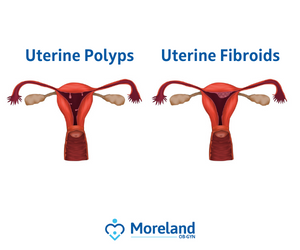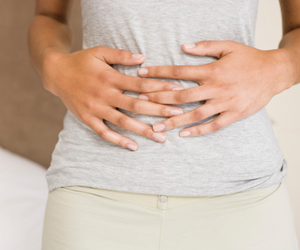Uterine Fibroids vs Polyps—do you know the difference?
 Most of us don’t spend a lot of time thinking about our uterus, that is, until something feels off. Then it becomes a focal point. Uterine fibroids and polyps can be tricky; they can fool you into thinking that “off” feeling is something you just have to live with.
Most of us don’t spend a lot of time thinking about our uterus, that is, until something feels off. Then it becomes a focal point. Uterine fibroids and polyps can be tricky; they can fool you into thinking that “off” feeling is something you just have to live with.
Uterine fibroids and endometrial polyps are both located in the uterus. Although many times they are discovered when a woman complains of problems with their menstrual cycle or is having difficulty getting pregnant, both uterine fibroids and endometrial polyps often cause no symptoms.
In this post, we’ll review uterine fibroids vs polyps, along with a review of:
- Risk factors
- Symptoms
- Treatment options
What is a Uterine Fibroid?
Uterine fibroids are noncancerous growths that can develop within or outside of the uterus. They range in size—from so small as to be undetectable by the human eye to as large as a grapefruit.
Uterine fibroids grow slowly, in most cases. They can affect fertility or pregnancy, depending on the size and location. And once estrogen and progesterone levels begin to wane during menopause, uterine fibroids may shrink.
An estimated 26 million US women between the age of 15 and 50 have uterine fibroids.* Of them, more than 15 million women will be affected by symptoms.
Risk Factors for Uterine Fibroids
The risk of developing fibroids can be affected by:
- Race: African American women are more likely to develop fibroids and at an earlier age. They are more likely to develop multiple and larger fibroids that bring on symptoms with greater severity. Asian women are less likely to develop fibroids.
- Genetics: If your mother or any sisters have or had fibroids, you’re more likely to develop them.
- Obesity: Overweight women are two to three times more likely to develop fibroids than average-weight women.
- Diet: Women with diets heavy in red meat and ham are more likely to develop uterine fibroids.
Risk factors that decrease the likelihood of developing uterine fibroids include:
- Number of term pregnancies: Women with multiple term pregnancies are less likely to experience fibroids than women who had no term pregnancies.
- Duration of oral contraceptive use: Long-term use of birth control pills reduces the risk of fibroids.
Some uterine fibroids exist without causing any symptoms. Others can grow to be a nuisance, causing discomfort, pain, and inconvenience.
What Are the Symptoms of Uterine Fibroids?
The most common symptoms uterine fibroids cause include:
- Menstrual changes
- Heavy periods
- Periods that last more than a week
- Spotting between periods
- Pelvic pressure
- Pressure on the bladder may cause frequent urination or difficulty emptying the bladder
- Pressure on the rectum may make it difficult to have a bowel movement
- Pain or discomfort during sex
- Fertility issues
- Anemia from heavy blood loss during menstruation and related fatigue
- Achy back and legs
Uterine Fibroid Treatments
Your Moreland OB-GYN provider will address your individual situation through a conversation about your symptoms and medical history, examination, ultrasound, and lab tests to determine your best course of treatment.
Your provider’s recommendations may include:
- Lifestyle changes: Maintaining a healthy weight and increasing green vegetables, fruit, and dairy consumption may help protect women from developing uterine fibroids.
- Oral contraceptives or other non-hormonal medications can help keep periods in check.
- Vitamins and iron: These help counter anemia due to heavy menstrual bleeding.
- Surgery: Your doctor may recommend surgery to treat fibroids. You and your doctor will discuss different options, along with the risks and benefits.
What is a Uterine Polyp?
Uterine polyps are formed when the lining of the uterus, endometrial tissue, doesn’t shed as it normally would during menstruation. Also called endometrial polyps, they are usually noncancerous, but there is a small risk that they can become precancerous or cancerous.
Uterine polyps can range in size from smaller than half a grain of rice to around the size of a golf ball. They occur in women of all ages, but most commonly in those between 40-49 years old. Women can have one or multiple uterine polyps. They may interfere with fertility.
Risk Factors for Uterine Polyps
Risk factors that can lead to the development of uterine polyps include:
- Being peri- or postmenopausal
- High blood pressure
- Obesity
- Taking the breast cancer therapy drug Tamoxifen
What are the Symptoms of Uterine Polyps?
Some women experience very mild or no symptoms from uterine polyps, while others may deal with uncomfortable, inconvenient symptoms, including:
- Menstrual changes
- Irregular periods
- Bleeding between periods
- Unusually heavy periods
- Postmenopausal vaginal bleeding
- Infertility
Uterine Polyps Diagnosis and Treatment
If your Moreland provider suspects you have uterine polyps, they may prescribe a transvaginal ultrasound or sonohysterogram to examine your uterus. As a course of treatment, their recommendations may include:
- Medication to mitigate the symptoms associated with the polyp
- Surgery to remove the polyp and have it examined for cancer
Your Moreland OB-GYN Can Help With Uterine Fibroids and Polyps
If you experience any of the symptoms or have any of the risk characteristics listed above, don’t err on the side of complacency. Don’t accept them as a sign of aging or a new “normal.”
Make an appointment with your Moreland OB-GYN provider to discuss your concerns. Before your appointment:
- Journal your symptoms.
- Create a list of all your medications.
- Develop a list of questions you have about your symptoms, fibroids, and polyps.
Uterine fibroids and polyps are manageable. Don’t allow them to limit you. Your Moreland provider can talk you through your treatment options so you can get back on track to being your best you.
The providers at Moreland OB-GYN are dedicated to providing women with compassionate OB-GYN care throughout life. This includes complete obstetrical care, gynecology, gynecologic and obstetric surgery, fertility services, preventive health care, and more. Learn more about our services and contact us online to request an appointment.
*Source: National Center for Biotechnology Information (NCBI)











